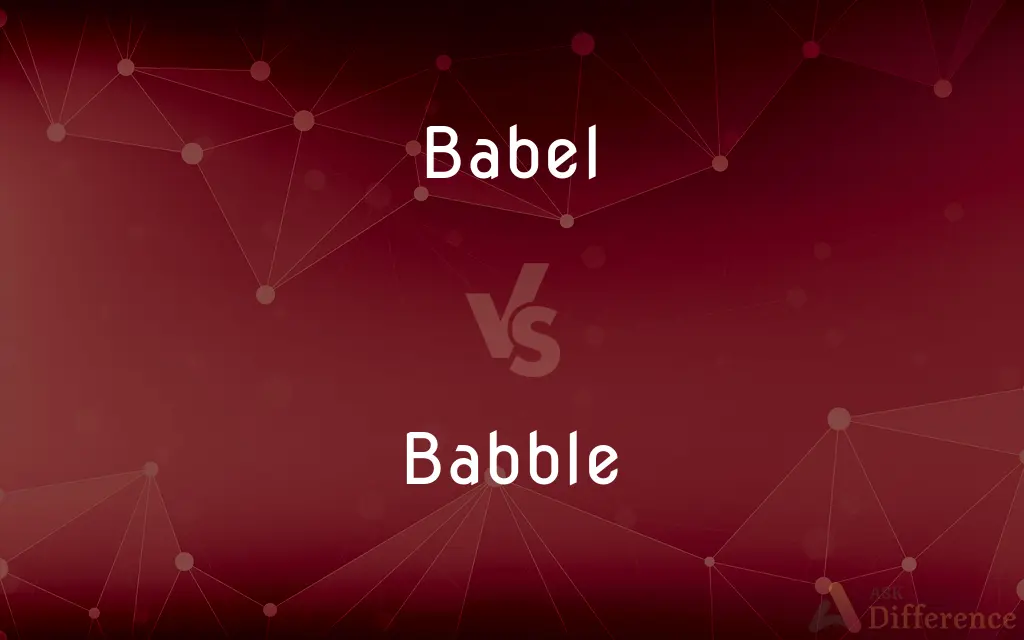Babel vs. Babble — What's the Difference?
By Maham Liaqat & Urooj Arif — Updated on April 22, 2024
Babel refers to a confusion of voices or sounds, originating from the Biblical tower story; babble implies incoherent or meaningless talk.

Difference Between Babel and Babble
Table of Contents
ADVERTISEMENT
Key Differences
Babel is often used to describe a scene where many people are talking simultaneously, creating a cacophony that is hard to understand, whereas babble is used to refer to the sound of people talking rapidly and continuously in a way that is hard to make sense of.
Babel has a historical and mythological connotation, linked to the Biblical Tower of Babel where God confused the languages of humanity, while babble does not carry such historical significance and is used more in everyday contexts.
In literature, "Babel" might be used metaphorically to describe any situation of linguistic or cultural confusion, whereas "babble" is typically used to describe nonsensical speech, often in a dismissive sense.
Babel also refers to a confusing noise made by a number of voices or sounds clashing together, on the other hand, babble specifically denotes the continuous murmuring sound made by water, people, or birds.
In terms of linguistic application, babel can be used to depict any confusing scenario where understanding is difficult due to multiple overlapping conversations, whereas babble is specifically about the character of the speech being disjointed or difficult to interpret.
ADVERTISEMENT
Comparison Chart
Definition
A confused noise made by multiple voices or sounds
Continuous low murmuring or disjointed speech
Origin
Biblical story of the Tower of Babel
Middle English, perhaps imitative of murmuring
Usage in language
Describes a scene of chaotic communication
Describes the manner of speech (often incoherent)
Metaphorical significance
Often symbolic of large-scale linguistic or cultural confusion
Usually indicates small-scale, often individual confusion or senselessness
Examples of application
"The meeting was a babel of voices."
"He tended to babble when nervous."
Compare with Definitions
Babel
A situation of cultural or linguistic confusion.
The international conference was a babel of many languages.
Babble
To talk foolishly or too much.
She would babble endlessly about her minor problems.
Babel
A historical reference to the Biblical tower.
His ambitious project was likened to the Tower of Babel.
Babble
Continuous low murmuring.
The audience's babble grew louder during the intermission.
Babel
A situation where understanding is difficult.
His explanation turned the lecture into a babel.
Babble
Nonsensical or meaningless chatter.
Ignoring the babble, he focused on his work.
Babel
A confused noise made by a number of voices or sounds.
The party was filled with babel from excited guests.
Babble
Incoherent or illogical speech.
The toddler’s babble was adorable yet confusing.
Babel
Used metaphorically to describe any noisy situation.
The stock market was a babel after the sudden crash.
Babble
The sound of flowing water.
The babble of the brook was soothing.
Babel
A confused noise made by a number of voices
The babel of voices on the road
Babble
Talk rapidly and continuously in a foolish, excited, or incomprehensible way
They babbled on about their holiday
Babel
A confusion of sounds or voices
Passengers chattering in a babel of tongues at the international airport.
Babble
(of a flowing water) make a continuous murmuring sound
The shallow river babbled over smooth rocks
Babel
A scene or situation of confusion
"a babel of commemorative ceremonies, statues, and tombs sponsored by competing cults of martyred revolutionaries" (Thomas L. Benjamin).
Babble
The sound of people talking simultaneously
A confused babble of voices
The answers were difficult to hear amid the babble of conversation
Babel
Alternative form of Babel
Babble
The continuous murmuring sound of flowing water
The babble of a brook
Babel
The city and tower in the land of Shinar, where the confusion of languages took place.
Therefore is the name of it called Babel.
Babble
To utter a meaningless confusion of words or sounds
Babies babble before they can talk.
Babel
Hence: A place or scene of noise and confusion; a confused mixture of sounds, as of voices or languages.
That babel of strange heathen languages.
The grinding babel of the street
Babble
To talk foolishly or idly; chatter
"As I babbled on ... I did not notice that my parents, in the front seat, had fallen completely silent" (Oliver Sacks).
Babel
A confusion of voices and other sounds
Babble
To make a continuous low, murmuring sound, as flowing water.
Babel
(Genesis 11:1-11) a tower built by Noah's descendants (probably in Babylon) who intended it to reach up to heaven; God foiled them by confusing their language so they could no longer understand one another
Babble
To utter rapidly and indistinctly
"Toward the end he babbled old stories, randomly cobbled together" (Julia Whitty).
Babble
To blurt out impulsively; disclose without careful consideration.
Babble
Inarticulate or meaningless talk or sounds.
Babble
Idle or foolish talk; chatter.
Babble
A continuous low, murmuring sound, as of flowing water.
Babble
(intransitive) To utter words indistinctly or unintelligibly; to utter inarticulate sounds
The men were babbling, so we couldn't make sense of anything.
Babble
(intransitive) To talk incoherently; to utter meaningless words.
Babble
(intransitive) To talk too much; to chatter; to prattle.
Babble
(intransitive) To make a continuous murmuring noise, like shallow water running over stones.
Hounds are said to babble, or to be babbling, when they are too noisy after having found a good scent.
Babble
(transitive) To utter in an indistinct or incoherent way; to repeat words or sounds in a childish way without understanding.
Babble
(transitive) To reveal; to give away (a secret).
Babble
Idle talk; senseless prattle
Babble
Inarticulate speech; constant or confused murmur.
Babble
A sound like that of water gently flowing around obstructions.
Babble
To utter words indistinctly or unintelligibly; to utter inarticulate sounds; as a child babbles.
Babble
To talk incoherently; to utter unmeaning words.
Babble
To talk much; to chatter; to prate.
Babble
To make a continuous murmuring noise, as shallow water running over stones.
In every babbling brook he finds a friend.
Babble
To utter in an indistinct or incoherent way; to repeat, as words, in a childish way without understanding.
These [words] he used to babble in all companies.
Babble
To disclose by too free talk, as a secret.
Babble
Idle talk; senseless prattle; gabble; twaddle.
Babble
Inarticulate speech; constant or confused murmur.
The babble of our young children.
The babble of the stream.
Babble
Gibberish resembling the sounds of a baby
Babble
Utter meaningless sounds, like a baby, or utter in an incoherent way;
The old man is only babbling--don't pay attention
Babble
To talk foolishly;
The two women babbled and crooned at the baby
Babble
Flow in an irregular current with a bubbling noise;
Babbling brooks
Babble
Divulge confidential information or secrets;
Be careful--his secretary talks
Common Curiosities
Can "Babel" be used in a positive context?
While typically associated with confusion, Babel can be used to depict a rich diversity of cultures or languages in a positive light.
What is the origin of the term "Babel"?
Babel comes from the Biblical story of the Tower of Babel where God confused the languages of the world.
Is "babble" only used to describe human speech?
No, it can also describe the continuous murmuring sound of things like water or birds.
Is "babble" ever used scientifically?
Yes, in psychology and linguistics, babble can refer to stages of speech development in children.
How is "Babel" viewed in religious contexts?
It is often viewed as a lesson on the limits of human ambition and the importance of divine order.
How do "Babel" and "babble" differ in their application?
Babel usually describes a broad, chaotic mix of sounds or languages, while babble is more about the quality of individual speech.
Are there any similar terms to "Babel" in other cultures?
Many languages have terms that reflect the story of Babel, emphasizing confusion and chaos.
What does "babble" typically refer to in speech?
Babble refers to talking in an incoherent or illogical manner, often nonsensically.
What can "Babel" symbolize in literature?
It often symbolizes the breakdown of communication and the challenges of diversity.
What type of scenarios are typically described as "Babel"?
Scenarios where many people are speaking at once, often in different languages.
What is a common misconception about "Babel"?
A common misconception is that Babel exclusively refers to the confusion of languages, rather than also symbolizing overall chaos.
Does "babble" have a negative connotation?
It can have a negative connotation when referring to speech that lacks substance or clarity.
How can "Babel" influence a social situation?
It can make communication difficult, leading to misunderstandings and lack of cohesion.
Can "babble" be stopped or controlled?
In contexts like speech therapy, techniques can be used to help individuals manage their babbling.
Can "babble" have any therapeutic uses?
Yes, in therapy, understanding babble can help in assessing and facilitating language development.
Share Your Discovery

Previous Comparison
Sea vs. River
Next Comparison
Filipino vs. FilipinaAuthor Spotlight
Written by
Maham LiaqatCo-written by
Urooj ArifUrooj is a skilled content writer at Ask Difference, known for her exceptional ability to simplify complex topics into engaging and informative content. With a passion for research and a flair for clear, concise writing, she consistently delivers articles that resonate with our diverse audience.














































